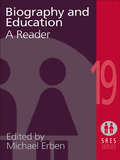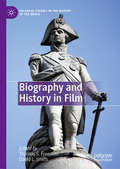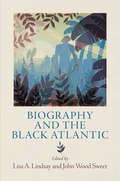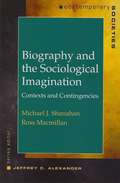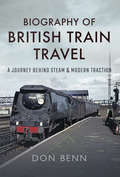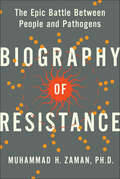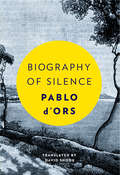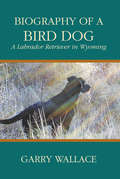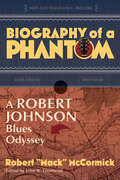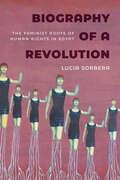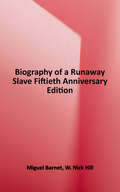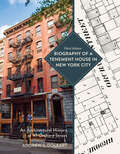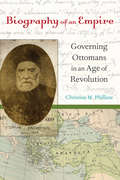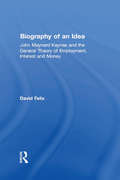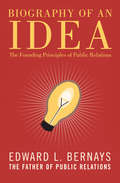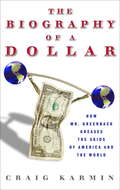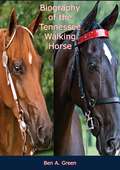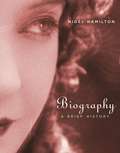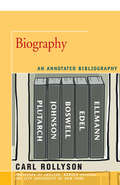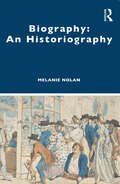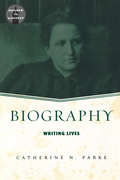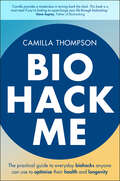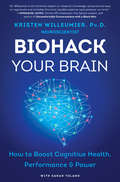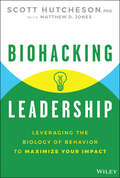- Table View
- List View
Biography and Education: A Reader (Social Research And Educational Studies)
by Michael ErbenOver recent years biographical studies have gained an increasingly important place in academic study. The two are inextricably linked. Education uses biography in teaching, and in biography, education features strongly as a formative stage in personal development. This book elaborates on the analytical work that has drawn attention to biography and education, and seeks to expand the understanding of lives in educational contexts. Mainstream sociology has been quick to embrace this treatment of individuals as biographical appearances, but it is even more relevant in the field of education.
Biography and History in Film (Palgrave Studies in the History of the Media)
by David L. Smith Thomas S. FreemanThe essays in this volume seek to analyze biographical films as representations of historical individuals and the times in which they lived. To do this, contributors examine the context in which certain biographical films were made, including the state of knowledge about their subjects at that moment, and what these films reveal about the values and purposes of those who created them. This is an original approach to biographical (as opposed to historical) films and one that has so far played little part in the growing literature on historical films. The films discussed here date from the 1920s to the 2010s, and deal with males and females in periods ranging from the Middle Ages to the end of the twentieth century. In the process, the book discusses how biographical films reflect changing attitudes towards issues such as race, gender and sexuality, and examines the influence of these films on popular perceptions of the past. The introduction analyses the nature of biographical films as a genre: it compares and contrasts the nature of biography on film with written biographies, and considers their relationship with the discipline of history. As the first collection of essays on this popular but understudied genre, this book will be of interest to historians as well as those in film and cultural studies.
Biography and the Black Atlantic
by John Wood Sweet Lisa A. LindsayIn Biography and the Black Atlantic, leading historians in the field of Atlantic studies examine the biographies and autobiographies of eighteenth- and nineteenth-century African-descended people and reflect on the opportunities and limitations these life stories present to studies of slavery and the African diaspora. The essays remind us that historical developments like slavery and empire-building were mostly experienced and shaped by men and women outside of the elite political, economic, and military groups whom historians often turn to as sources.Despite the scarcity of written records and other methodological challenges, the contributors to Biography and the Black Atlantic have pieced together vivid glimpses into lives of remarkable, through previously unknown, enslaved and formerly enslaved people who moved, struggled, and endured in different parts of Africa, the Americas, and Europe. From the woman of Fulani origin who made her way from Revolutionary Haiti to Louisiana to the free black American who sailed for Liberia and the former slave from Brazil who became a major slave trader in Angola, these stories render the Atlantic world as a densely and sometimes unpredictably interconnected sphere. Biography and the Black Atlantic demonstrates the power of individual stories to illuminate history: though the life histories recounted here often involved extraordinary achievement and survival against the odds, they also portray the struggle for self-determination and community in the midst of alienation that lies at the heart of the modern condition.Contributors: James T. Campbell, Vincent Carretta, Roquinaldo Ferreira, Jean-Michel Hébrard, Martin Klein, Lloyd S. Kramer, Sheryl Kroen, Jane Landers, Lisa A. Lindsay, Joseph C. Miller, Cassandra Pybus, João José Reis, Rebecca J. Scott, Jon Sensbach, John Wood Sweet.
Biography and the Sociological Imagination: Contexts and Contingencies
by Michael J. Shanahan Ross MacmillanBecause life course sociology is an imaginative framework, Biography and the Sociological Imagination is less about "what we know" about the life course and more about "how to think" about changing societies and aging by drawing on life course ideas. Drawing from the latest research and using stories of real people, Shanahan and Macmillan spur readers to imagine alternative ways of organizing society and the implications of these alternatives for the biography.
Biography of British Train Travel: A Journey Behind Steam & Modern Traction
by Don BennRailway Anthology is a collection of mainly previously unpublished articles and short stories, covering a lifelong interest in railways. It spans a wide spectrum over the years, from the early days in Kent in 1960, through the many hours on the lineside on the Surrey Hills line and the South Western main line, to the last frantic years of steam on the Southern, and the current steam scene, as well as the privileged and exciting times spent riding on the footplate of steam locomotives. It majors on the authors main railway passions of steam locomotives, train running performance, including modern motive power and all matters Southern. Locomotive performance in Europe and a tramway are also included, as is a fascinating minor- and little-visited narrow gauge railway in Southern England, plus heritage traction on the London Underground.The book comprises approximately 350 illustrations, many in colour, as well as contemporary timetable extracts and copies of notebook pages, which cover shed visits in Scotland. Fifty train running logs are included, together with some detailed records of days spent by the linesides of railways when steam was still the predominant motive power in parts of the south.
Biography of Resistance: The Epic Battle Between People and Pathogens
by Muhammad H. ZamanAward-winning Boston University educator and researcher Muhammad H. Zaman provides a chilling look at the rise of antibiotic-resistant superbugs, explaining how we got here and what we must do to address this growing global health crisis.In September 2016, a woman in Nevada became the first known case in the U.S. of a person who died of an infection resistant to every antibiotic available. Her death is the worst nightmare of infectious disease doctors and public health professionals. While bacteria live within us and are essential for our health, some strains can kill us. As bacteria continue to mutate, becoming increasingly resistant to known antibiotics, we are likely to face a public health crisis of unimaginable proportions. “It will be like the great plague of the middle ages, the influenza pandemic of 1918, the AIDS crisis of the 1990s, and the Ebola epidemic of 2014 all combined into a single threat,” Muhammad H. Zaman warns.The Biography of Resistance is Zaman’s riveting and timely look at why and how microbes are becoming superbugs. It is a story of science and evolution that looks to history, culture, attitudes and our own individual choices and collective human behavior. Following the trail of resistant bacteria from previously uncontacted tribes in the Amazon to the isolated islands in the Arctic, from the urban slums of Karachi to the wilderness of the Australian outback, Zaman examines the myriad factors contributing to this unfolding health crisis—including war, greed, natural disasters, and germophobia—to the culprits driving it: pharmaceutical companies, farmers, industrialists, doctors, governments, and ordinary people, all whose choices are pushing us closer to catastrophe.Joining the ranks of acclaimed works like Microbe Hunters, The Emperor of All Maladies, and Spillover, A Biography of Resistance is a riveting and chilling tale from a natural storyteller on the front lines, and a clarion call to address the biggest public health threat of our time.
Biography of Silence: An Essay on Meditation
by Pablo D'OrsA publishing phenomenon in Spain: a moving, lyrical, far-ranging meditation on the deep joys of confronting oneself through silence by a Spanish priest and Zen disciple.With silence increasingly becoming a stranger to us, one man set out to become its intimate: Pablo d'Ors, a Catholic priest whose life was changed by Zen meditation. With disarming honesty and directness, as well as a striking clarity of language, d'Ors shares his struggles as a beginning meditator: the tedium, restlessness, and distraction. But, persevering, the author discovers not only a deep peace and understanding of his true nature, but also that silence, rather than being a retreat from life, offers us an intense engagement with life just as it is. Imbued with a rare beauty, Biography of Silence shows us the deep joy of silence that is available to us all.
Biography of a Bird Dog: A Labrador Retriever in Wyoming
by Garry WallaceAs you might expect, Biography of a Bird Dog is the story of a man and his dog. But it is more than that, it’s a memoir of not only a puppy’s first year of life, but of a middle-aged man’s appraisal of his own life and career in a small town in Wyoming. <P><P> As Ebenezer, his bird dog, is nearing the end of his hunting career, the author decides to add a new puppy to the family, with the intention of using all he has learned to train her to achieve the full potential of her breed, a process that turns out to be filled with both joy and frustration. When tragedy strikes, he must re-evaluate his own plans along with his dog’s future.
Biography of a Phantom: A Robert Johnson Blues Odyssey
by Robert Mack McCormickThe drama of In Cold Blood meets the stylings of a Coen brothers film in this long-lost manuscript from musicologist Robert &“Mack&” McCormick, whose research on blues icon Robert Johnson's mysterious life and death became as much of a myth as the musician himselfWhen blues master Robert Johnson&’s little-known recordings were rereleased to great fanfare in the 1960s, little was known about his life, giving rise to legends that he gained success by selling his soul to the devil. Biography of a Phantom: A Robert Johnson Blues Odyssey is musicologist Mack McCormick's all-consuming search, from the late 1960s until McCormick&’s death in 2015, to uncover Johnson's life story. McCormick spent decades reconstructing Johnson's mysterious life and developing theories about his untimely death at the age of 27, but never made public his discoveries. Biography of a Phantom publishes his compelling work for the first time, including 40 unseen black-and-white photographs documenting his search.While knocking on doors and sleuthing for Johnson's loved ones and friends, McCormick documents a Mississippi landscape ravaged by the racism of paternalistic white landowners and county sheriffs. An editor's preface and afterword from Smithsonian curator John W. Troutman provides context as well as troubling details about McCormick&’s own impact on Johnson&’s family and illuminates through McCormick&’s archive the complex legacy of white male enthusiasts assuming authority over Black people&’s stories and the history of the blues.While Johnson died before achieving widespread recognition, his music took on a life of its own and inspired future generations. Biography of a Phantom, filled with lush descriptive fieldwork and photographs, is an important historical object that deepens the understanding of a stellar musician.
Biography of a Revolution: The Feminist Roots of Human Rights in Egypt
by Dr. Lucia SorberaIt is not Egypt's 2011 revolution that opened a space for women's and feminist activism, but—as this book shows—the long history of women's activism that created the intellectual and political background for revolution. By centering the experiences and ideas of multiple generations of women activists and intellectuals, Lucia Sorbera traces the feminist genealogies of Egypt's nationalist, student, Marxist, labor, human rights, and democratic social movements. Biography of a Revolution gathers a series of interrelated intimate and relational stories, charting in vivid detail the entanglements between women's aspirations across a century of politics and friendships. This historical analysis innovatively deploys decolonial and indigenous feminist epistemologies, bringing women's, gender, and feminist history into the center of Egypt's political, social, and intellectual history. More than a decade after the 2013 military coup, women's intellectual and political activism remains crucial to keeping the embers of revolution aglow.
Biography of a Runaway Slave: Fiftieth Anniversary Edition
by Miguel BarnetFiftieth Anniversary Edition Originally published in 1966, Miguel Barnet's Biography of a Runaway Slave provides the written history of the life of Esteban Montejo, who lived as a slave, as a fugitive in the wilderness, and as a soldier fighting against Spain in the Cuban War of Independence. A new introduction by one of the most preeminent Afro-Hispanic scholars, William Luis, situates Barnet's ethnographic strategy and lyrical narrative style as foundational for the tradition of testimonial fiction in Latin American literature. Barnet recorded his interviews with the 103-year-old Montejo at the onset of the Cuban Revolution. This insurgent's history allows the reader into the folklore and cultural history of Afro-Cubans before and after the abolition of slavery. The book serves as an important contribution to the archive of the black experience in Cuba and as a reminder of the many ways that the present continues to echo the past.
Biography of a Tenement House in New York City: An Architectural History of 97 Orchard Street
by Andrew S. Dolkart"I trace my ancestry back to the Mayflower," writes Andrew S. Dolkart. "Not to the legendary ship that brought the Pilgrims to Plymouth, Massachusetts, in 1620, but to the more prosaic tenement on the southeast corner of East Broadway and Clinton Street named the Mayflower, where my father was born in 1914 to Russian-Jewish immigrants." For Dolkart, his father's experience of being raised in a tenement became a metaphor for the life that was afforded countless immigrant children growing up in Lower Manhattan during the past century. In this revised edition of his classic book, Dolkart presents for us a precise and informative biography of a typical tenement house in New York City that became, in 1988, the site for the Lower East Side Tenement Museum. The author documents, analyzes, and interprets the architectural and social history of this building at 97 Orchard Street, beginning in the 1860s when it was erected, moving on to the late nineteenth and early twentieth centuries when the neighborhood started to change, and concluding in the present day as the building is reincarnated as the museum. This edition includes new research on the basement storefronts (specifically the Schneider saloon and the kosher butcher), the backyard privies and their reconstruction, and the new Irish Moore apartment. Biography of a Tenement House in New York City is a lasting tribute to the legacy of immigrants and their children, who were part of the transformation of New York City and the fabric of everyday American urban life. Distributed for the Center for American Places at ColumbiaCollege Chicago
Biography of an Empire
by Christine M. PhilliouThis vividly detailed revisionist history opens a new vista on the great Ottoman Empire in the early nineteenth century, a key period often seen as the eve of Tanzimat westernizing reforms and the beginning of three distinct histories--ethnic nationalism in the Balkans, imperial modernization from Istanbul, and European colonialism in the Middle East. Christine Philliou brilliantly shines a new light on imperial crisis and change in the 1820s and 1830s by unearthing the life of one man. Stephanos Vogorides (1780-1859) was part of a network of Christian elites known phanariots, institutionally excluded from power yet intimately bound up with Ottoman governance. By tracing the contours of the wide-ranging networks--crossing ethnic, religious, and institutional boundaries--in which the phanariots moved, Philliou provides a unique view of Ottoman power and, ultimately, of the Ottoman legacies in the Middle East and Balkans today. What emerges is a wide-angled analysis of governance as a lived experience at a moment in which there was no clear blueprint for power.
Biography of an Idea: John Maynard Keynes and the General Theory of Employment, Interest and Money
by David FelixThe culmination of John Maynard Keynes's thought and lifework was The General Theory of Employment, Interest and Money. Here, placing it in the context of his era, David Felix examines the evolution of Keynes's theorizing. He boldly claims that The General Theory lacks logical and factual support as pure theory, but is an achievement of great statesmanship in political economy.Felix argues that Keynes's ideas have misled successive generations of students and practitioners. He suggests that a more discriminating view of his thought can reconcile Keynesian views with neoclassical theory and replace the false synthesis that dominates contemporary text-books with a truer one. Biography of an Idea devotes four chapters to an analysis of The General Theory and an examination of the economic logic of Keynes. The author disentangles the work's fundamentally simple theses from its difficult technical pre-sentation. He shows how Keynes shaped his economic model as he did as an effort to win public support for sensible policies that clashed with generally accepted beliefs of the time.Biography of an Idea is bound to be controversial due to the many cohorts of economists who have been trained in macroeconomics according to Keynes. It will be of interest and ac-cessible to intellectually curious laymen and students, and important to economists, historians, and political scientists.
Biography of an Idea: The Founding Principles of Public Relations
by Edward L. BernaysThe father of public relations looks back on a landmark life spent shaping trends, preferences, and general opinion A twentieth-century marketing visionary, Edward L. Bernays brilliantly combined mastery of the social sciences with a keen understanding of human psychology to become one of his generation's most influential social architects. In Biography of an Idea, Bernays traces the formative moments of his career, from his time in the Woodrow Wilson administration as one of the nation's key wartime propagandists to his consultancy for such corporate giants as Procter & Gamble, General Electric, and Dodge Motors. While working with the American Tobacco Company, Bernays launched his now-infamous Lucky Strike campaign, which effectively ended the long-standing taboo against women smoking in public. With his vast knowledge of the psychology of the masses, Bernays was in great demand, advising high-profile officials and counseling the tastemakers of his generation. His masterful and at times manipulative techniques had longstanding influences on social and political beliefs as well as on cultural trends. Biography of an Idea is a fascinating look at the birth of public relations--an industry that continues to hold sway over American society.
Biography of an Industrial Town: Terni, Italy, 1831–2014 (Palgrave Studies in Oral History)
by Alessandro PortelliA pioneering work in oral history, this book tells the story of the rise and fall of the industrial revolution and the apogee and crisis of the labor movement through an oral history of Terni, a steel town in Central Italy and the seat of the first large industrial enterprise in Italy. This story is told through a combination of stories, songs, myths and memories from over 200 voices of five generations, woven with a wealth of archival material.
Biography of the Dollar
by Craig KarminWill the sun set on the greatest currency in the history of the world? For decades the dollar has been the undisputed champ. It’s not only the currency of America but much of the world as well, the fuel of global prosperity. As the superengine of the world’s only superpower, it’s accepted everywhere. When an Asian company trades with South America, those transactions are done in dollars, the currency of international business. But for how much longer? Economists fear America is digging a hole with an economy based on massive borrowing and huge deficits that cloud the dollar’s future. Will the buck be eclipsed by the euro or even China’s renminbi? Should Americans worry when the value of the mighty U. S. dollar sinks to par with the Canadian “loonie”? Craig Karmin’s in-depth “biography” of the dollar explores these issues. It also examines the green-back’s history, allure, and unique role as a catalyst for globalization, and how the American buck became so almighty that $ became perhaps the most powerful symbol on earth. Biography of the Dollarexplores every aspect of its subject: the power of the Federal Reserve, the inner sanctums of foreign central banks that stockpile the currency, and the little-known circles of foreign exchange traders that determine a currency’s worth. It traces the dollar’s ascendancy, including one incredibly important duck-hunting trip and the world-changing Bretton Woods Conference. With its watermark, color-shifting inks, and a presidential portrait that glows under ultraviolet light, the dollar has obsessed foreign governments, some of which have tried to counterfeit it. Even Saddam Hussein, who insisted on being paid in euros for oil, had $750,000 in hundred-dollar bills when captured. Yet if a worldwide currency has enabled a global economy to flourish, it’s also allowed the United States to owe unbelievable, shocking amounts of money—paying hundreds of millions of dollars every single day just in interest on foreign debt; that’s raised concerns that the dollar standard may not be sustainable. Any threat to the dollar’s privileged status would do much more than hurt American pride. It would mean U. S. companies and citizens would not be able to borrow at the low rates they have become accustomed to. The dollar’s demise would impact the rest of the world, too, boosting the costs of trade and investment if no other currency was able to play the same crucial role. Ultimately the dollar system may weaken, but it should endure—a while longer, at least; it’s in few people’s interest to see it fail, and there is still no credible alternative. Biography of the Dollaris must reading for anyone who wants to understand what truly makes the world go ’round—and whether it will continue to spin the way we want it to. From the Hardcover edition.
Biography of the Tennessee Walking Horse
by Ben A. GreenA NEWSPAPERMAN’S VERSION OF THE “BIG STORY” OF THE TENNESSEE WALKING HORSEThe Tennessee Walking Horse is a breed of gaited horse known for its unique four-beat running-walk and flashy movement. It was originally developed in the southern United States for use on farms and plantations. It is a popular riding horse due to its calm disposition, smooth gaits and sure-footedness. The Tennessee Walking Horse is often seen in the show ring, but is also popular as a pleasure and trail riding horse using both English and Western equipment. Tennessee Walkers are also seen in movies, television shows and other performances.
Biography: A Brief History
by Nigel HamiltonFor thousands of years we have recorded real lives--the lives of others, and of ourselves. For what purpose and for whom has this universal and timeless pursuit endured? What obstacles have lain in the path of biographers in the past, and what continues to confound biographers today? Above all, how is it that biographies and autobiographies play such a contested, popular role in contemporary Western culture, from biopics to blogs, from memoir to docudrama? Award-winning biographer and teacher Nigel Hamilton addresses these questions in an incisive and vivid narrative that will appeal to students of human nature and self-representation across the arts and sciences. Tracing the remarkable and often ignored historical evolution of biography from the ancient world to the present, this brief and fascinating tour of the genre conveys the passionate quest to capture the lives of individuals and the many difficulties it has entailed through the centuries. From the Epic of Gilgamesh to American Splendor, from cuneiform to the Internet, from commemoration to deconstruction, from fiction to fact--by way of famous biographical artists such as Plutarch, Saint Augustine, Sir Walter Raleigh, Samuel Johnson, Jean-Jacques Rousseau, Lord Byron, Sigmund Freud, Lytton Strachey, Abel Gance, Virginia Woolf, Leni Riefenstahl, Orson Welles, Julian Barnes, Ted Hughes, Frank McCourt, and many others--Nigel Hamilton's Biography: A Brief History will change the way you think about biography and real lives.
Biography: An Annotated Bibliography
by Carl RollysonThis is the only comprehensive, annotated bibliography of writing about biography. Rollyson, a biographer and scholar of biography, includes chapters on the history of biography (beginning in the Greco-Roman period and concluding with biographers such as Leon Edel and Richard Ellmann). Ample sections on psychobiography, the new feminist biography, and on biographers who appear in works of fiction, are also included. Cited in many recent books on the genre of biography, Biography: An Annotated Bibliography, is an essential research tool as well as a clearly written work for those wishing to browse through the commentary on this important genre.
Biography: An Historiography
by Melanie NolanBiography: An Historiography examines how Western historians have used biography from the nineteenth century to the present – considering the problems and challenges that historians have faced in their biographical practice systematically. This volume analyses the strategies and methods that historians have used in response to seven major issues identified over time to do with evidence, including but not limited to the problem of causation, the problem of fact and fiction, the problem of other minds, the problem of significance or representativeness, the problems of perspective, both macro and micro, and the problem of subjectivity and relative truth. This volume will be essential for both postgraduates and historians studying biography.
Biography: Writing Lives (Genres In Context Ser.)
by Catherine N. ParkeCatherine Parke explores biography through detailed examinations of Samuel Johnson, Virginia Woolf, Langston Hughes, Gertrude Stein and other masters of the genre.
Biohack Me: The Practical Guide to Everyday Biohacks Anyone Can Use to Optimise Their Health and Longevity
by Camilla ThompsonSupercharge your life. One biohack at a time. Do you struggle to prioritise your health amongst the demands of a busy lifestyle? Are you afraid of growing old and not thriving in your later years? Then maybe biohacking is for you. Biohacking is all about hacking your biology and environment so you can live better for longer. It involves making small, incremental changes to your lifestyle and diet today that will improve your health, vitality and wellbeing into the future. Biohacking proves that we have more control over ageing than what we might think. With Biohack Me, you'll discover that ageing is something we should embrace, not fear. Author Camilla Thompson is a trailblazer in biohacking, nutrition, and health coaching. As a trusted coach and wellness mentor, Camilla has dedicated nearly a decade of her life to helping others optimise their health and longevity. In this powerful guide, she provides clear, actionable strategies that will empower you to take charge of your health and protect your cognitive and physical wellbeing as you age. By learning the biohacking framework outlined in this book, you can improve your sleep, mood, health, relationships, brain and so much more. You'll learn: The importance of sleep rituals and habits, like nasal breathing and your circadian rhythm Strategies to boost your energy though intermittent fasting, red-light therapy and cold exposure How to revolutionise your relationship with stress and anxiety using the circle of control Methods to improve your nervous system function, such as breathwork and acupuncture Why neuroplasticity is crucial for optimum long-term brain function How a nutrient-rich diet, hydration hacks and cognitive training can improve your overall brain health Once you master the biohacking basics, you will unlock your full potential and transform your mind and body for the better. Whether you're a health newbie or a seasoned wellness warrior, Biohack Me is your ticket to supercharging your life.
Biohack Your Brain: How to Boost Cognitive Health, Performance & Power
by Kristen WilleumierA neuroscientist’s groundbreaking, science-driven plan for revitalizing, nourishing and rejuvenating your most essential asset—your brain.Your brain is the most essential organ in your body. The brain and spinal cord are intimately connected to every bodily system and organ, so when it is balanced everything in your body and mind will function more efficiently. It’s vitally important to take proactive steps now, or you risk losing everything, including your ability to think clearly, be creative, remember details, solve problems and retain your memory.In Biohack Your Brain, leading neuroscientist Dr. Kristen Willeumier reveals how you can change your brain by making simple and easy modifications to your lifestyle. Combining clinical experience with revolutionary science, she details how biohacking your brain can boost your cognitive performance and so much more.Dr. Willeumier’s essential guidebook shows you the most effective techniques to prevent memory loss and neurodegenerative disorders like Alzheimer’s disease—and even how to overcome negative thoughts and stress. Through research and case studies, you’ll learn how to upgrade your nutritional choices along with the effective use of supplements, brain games, and physical activity to overcome cognitive damage, whether it’s from previous injuries, such as a concussion or a bad fall or from the effects of living in modern day times.Dr. Willeumier shares her own story alongside those from the NFL players and other clients she has worked with to help you leverage the latest research to find personal solutions. Biohack Your Brain teaches you how to take better care of your brain, and also how to enhance your memory, lose excess weight, increase your energy and vitality in order to create the best health and life possible.
Biohacking Leadership: Leveraging the Biology of Behavior to Maximize Your Impact
by Scott HutchesonRethinking leadership through a scientific approach to human connection and performance Built on a dual foundation of rigorous research and real-world application, Biohacking Leadership: Leveraging the Biology of Behavior to Maximize Your Impact explores how leaders can apply biohacking principles to understanding and leverage the biological and behavioral drivers of decision-making, influence, and impact. The first in a three-part series, this book discusses how to optimize your leadership by using neuroscience and biomechanics to enhance your mental and physical state, fostering more effective communication, emotional regulation, and collaboration. Each concept and strategy in this book is informed by science, but the insights are presented in an accessible, actionable way, discussing topics including: The concept of leadership biodynamics as a set of three channels and the 18 biometric signals that represent the essential dimensions of effective leadership: warmth, competence, and gravitas How insights from nature's keystone species—beavers, wolves, and sea stars—illustrate the impact of creating balance, inclusivity, and shared value How to deliver results with clarity and credibility by mastering complexity, decision-making, and alignment with strategic goals The critical role of creativity, adaptability, and play in fostering innovation, resilience, and team cohesion Biohacking Leadership: Leveraging the Biology of Behavior to Maximize Your Impact is an essential guide for all professionals seeking to harness cutting-edge scientific research and developments and to bring their organizations to new heights.
